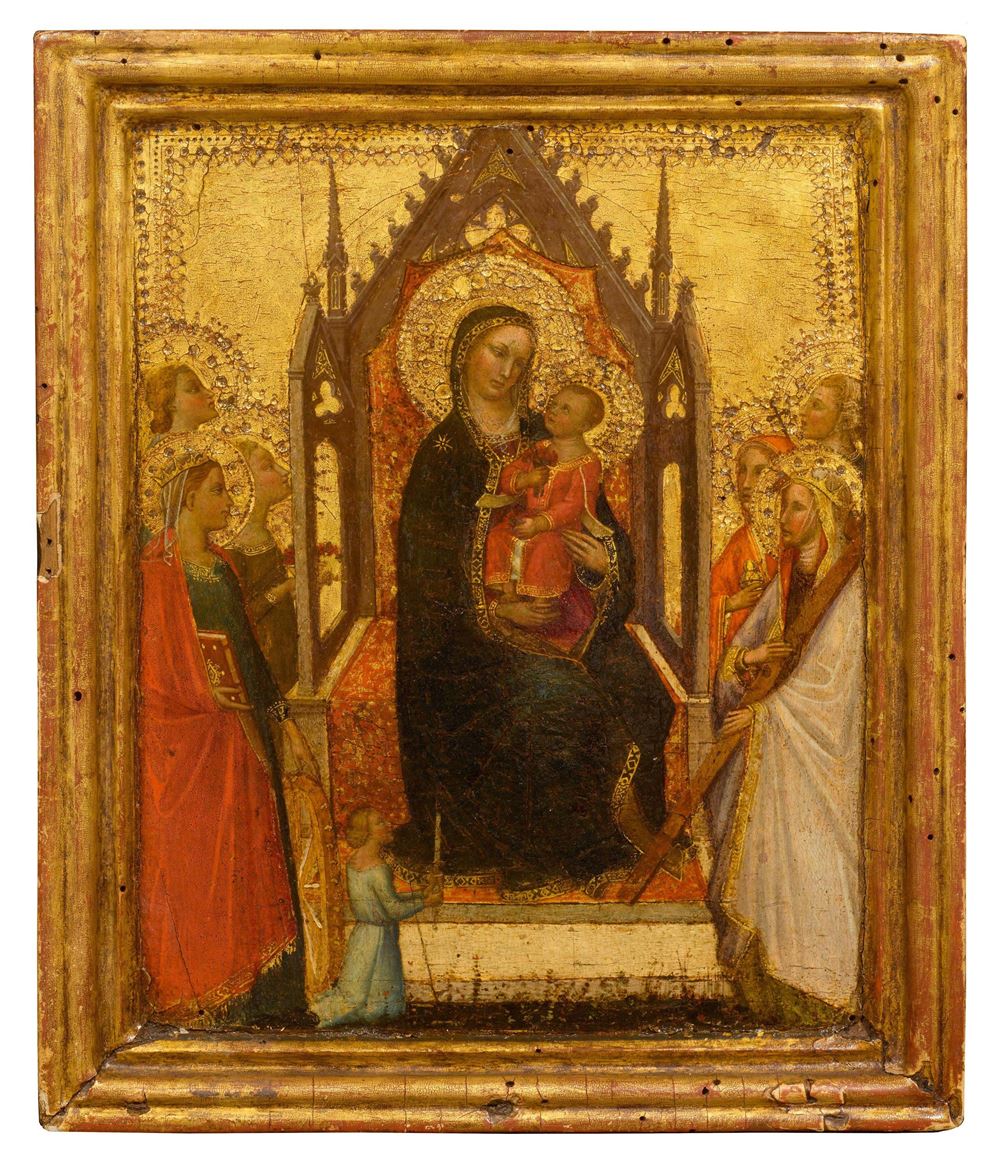
Lot 3002* - A172 Tableaux de Maîtres Anciens - vendredi, 27. mars 2015, 15h00
MASTER OF THE CHRISTCHURCH CORONATION
Provenance: Formerly private collection Mario und Giuseppe Bellini family, around 1900-1930.
Literature: Scalella, Cecilia: Contributi alla pittura fiorentina del secondo trecento: il Maestro dell'Incoronazione della Christ Church Gallery, in: Arte Cristiana, Vol. 89, 2001, p. 129, Fig. 17.
On a massive and broadly projecting architectonic throne, draped with a rich gold brocade cloth, sits the Mother of God holding her child lovingly in her arms. At her feet a small young girl kneels with a candle in her hands, indicating her readiness to follow the wise virgins of Matthew's Gospel (Matthew 25: 1-13), to be a light-bearing bride of Christ. These brides, namely the female saints, are gathered around the throne, where they are witnesses to this silent and solemn ceremony. With the exception of a young knight with a cross (John Gualbertus?), all of the figures are holy virgins. This iconography suggests that the picture was commissioned to give to a young woman entering a convent as a dowry and devotional object for her cell. If the young knight with the cross in his hand in the background right can be identified as John Gualbertus, the founder of the Vallambrosian Order, it is conceivable that the young novice in the foreground joined the female branch of this order, possibly the Monastery of Santa Verdiana in Florence. The painting was published and illustrated for the first time in 2001, in an article by Cecilia Scalella on the Florentine painter named after the Coronation of the Virgin in the Christ Church Gallery, Oxford. With reference to Miklòs Boskovits, the author incorporated it in her extended catalogue raisonné of the so-called Maestro dell' Incoronazione della Christ Church Gallery, a Florentine painter presumably active in the years between 1345 and 1375. Art history is indebted to Richard Offner for the first profile of this painter (in: Shorr, D.: The Christ Child in Devotional Images in Italy during the 14th Century, New York 1954), found in his initial catalogue raisonné of the Coronation of the Virgin in the Christ Church Gallery, Oxford. This was subsequently extended by Federico Zeri (in: Gazette des Beaux-Arts, LXXI, 1968, p. 70) and Miklòs Boskovits (Fioerntina Pittura alla del Rinascimento vigilia, Florence 1975, p. 212, no. 56). On the suggestion of Miklòs Boskovits, Cecilia Scalella added the little picture in question to the painter's list of works. In a report of 5 February 2003, Piero Torriti, a former conservator in Siena (who was apparently unaware of the article by Cecilia Scalella in Arte Cristiana 2001), referred to artistic relationships between our small panel painting and the work of Bernardo Daddi, one of the leading Florentine painters of the first half of the Trecento. The artistic reference to Bernardo Daddi (1295 - 1348) is apparent, as this picture is modelled compositionally on Bernardo Daddi's late work such as the Madonna of the San Pancrazio altar in the Uffizi, Florence, or the Maestà for the small winged altarpiece of 1338, in the Courtauld Gallery, London. Whoever is concealed behind the so-called Maestro dell' Incoronazione della Christ Church Gallery, it is clear that he was oriented towards the late work of the artistic elite in this period. Its relation to the remaining work of the present master, though showing a slightly softer modelling style, testifies to clear knowledge of the painterly tendencies around the late Bernardo Daddi and his associate Puccio di Simone; likewise can be felt certain characteristics of the depiction of the complexion, as can be seen in new fineness of the work by the emerging Giovanni da Milano and the so-called Giottino. This leads to the conclusion that our lovely small Madonna image originated around ca.1350-55 in Florence and in the immediate circle of the best exegetes of Bernardo Daddi. Surely this paintin
CHF 180 000 / 250 000 | (€ 185 570 / 257 730)
Vendu pour CHF 228 000 (frais inclus)
Aucune responsabilité n'est prise quant à l´exactitude de ces informations.

